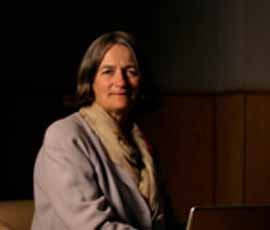A magazine where the digital world meets the real world.
On the web
- Home
- Browse by date
- Browse by topic
- Enter the maze
- Follow our blog
- Follow us on Twitter
- Resources for teachers
- Subscribe
In print
What is cs4fn?
- About us
- Contact us
- Partners
- Privacy and cookies
- Copyright and contributions
- Links to other fun sites
- Complete our questionnaire, give us feedback
Search:
A woman's touch
There's long been a misconception that women and computers don't mix. This has been a major reason for there being so few women working as computing professionals. Noorie Noorjahan Jalil, a computer science student at Queen Mary, University of London, investigates.
Through no fault of our own we have been led to believe that women are more suited to the creative fields and that technology is strictly a male profession. We have all seen differences in teaching styles: boys being guided more towards logic and girls towards creativity, so pushing girls away from IT. There are many other subtle social pressures having a similar effect. It's time we stopped issues like this from playing such a huge part in how women choose their career paths. Computer Scientists are often portrayed as 'Geeks'. If more women took the subject it might help break this nonsense stereotype. We are not loners without social lives; in fact it's the complete opposite. Those who can break free from this kind of pressure from society and who aren't worried about how they come across to others can make a big difference: both in representing women and having a personal impact on the way we all live our lives through the technology they create.

One problem is that men's contributions to the field are often given greater recognition than women's. Bill Gates is well known, for example. What about Emmy Noether? She did abstract algebra research that provided the basis for Prolog. It's an advanced programming language used for artificial intelligence and computer linguistics. In 1837 Ada Lovelace became the 'World's First Programmer' after her contribution to Babbage's attempts to build the first computer. Surely Charles Babbage deserved the title? Wrong. It was Ada was able first to create an algorithm (a series of instructions) that could be processed by a computer. So...it was a woman who made the first real contribution to computer science. In 2004, a 9 year-old Pakistani girl became Microsoft's youngest employee. This achievement at such a young age should an inspiration to us all. She didn't worry about her gender or age. Neither were a barrier to the profession she chose. In January 2012, Professor Ursula Martin, a female professor at Queen Mary, University of London, was awarded a CBE for her contribution to computer science. She shows what we women can accomplish in the world of technology if we take a stand against the impression that 'women are just not suited for computer science'.
It's frustrating to see so much young talent go to waste because of pressure from society. We are not being appreciated as much as we deserve. Women past and present have shown how much we can contribute to computer science. It may not be every girl's dream subject, but those for which it could be should not be put off by social barriers. The women of the past have shown what can be done, so why not the rest of us? If we really are good at creative subjects why not apply that creative touch to the world of technology? Things would be much more exciting with a woman's touch...


